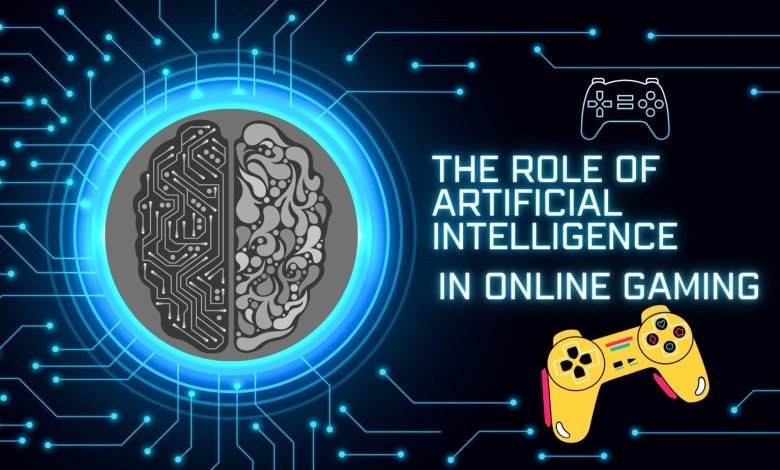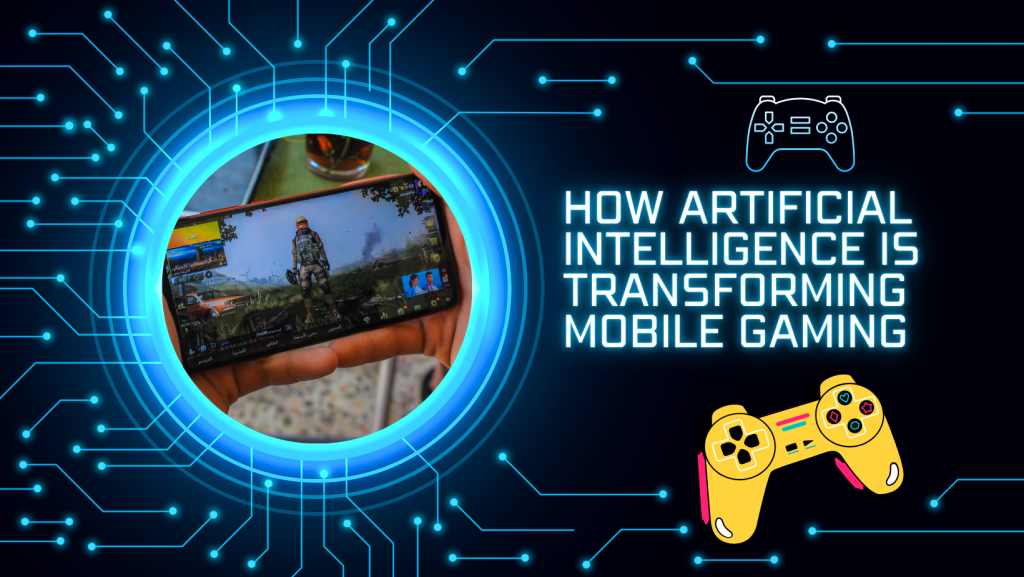The Role of Artificial Intelligence in Online Gaming

In recent years, artificial intelligence (AI) has made significant advancements in various industries, and the world of mobile gaming is no exception. AI technology is revolutionizing the way games are developed, played, and experienced. With its ability to enhance gameplay experiences, create intelligent virtual opponents, provide real-time player support, detect fraud, and transform game design and development, AI is reshaping the landscape of mobile gaming. In this article, we will explore how artificial intelligence is transforming mobile gaming and revolutionizing the way we interact with games on our smartphones.
Game designers strive to create captivating experiences that leave players enthralled and craving for more. With the advent of AI technology, real-time player support, fraud detection, and strategies to combat cheating have also taken center stage. In this article, we will explore the exciting realm of faster and better game design in board games, the integration of AI in real-time player support and fraud detection, and the measures implemented to address cheating in board games.
Faster & Better Game Design
Artificial Intelligence (AI) has revolutionized the world of online gaming, bringing about faster and better game design. With AI-powered algorithms and machine learning techniques, game developers can create immersive and engaging gaming experiences. By analyzing player behavior and preferences, AI can generate dynamic and adaptive game content, ensuring that players are constantly challenged and entertained.
For instance, if you want an Online ludo game or an MMORPG, you can easily instruct an AI what you want it to look like and what features it has to have; the AI will then code and build the assets for you. This can save game development studios a tonne of time and money because they won’t have to spend as much time building trees, rocks, and wind effects, allowing them to concentrate on the game’s more crucial parts.
Additionally, AI algorithms can generate procedural content, creating infinite possibilities for game worlds, levels, and missions. This not only saves development time but also ensures that players always have something new to explore. Artificial Intelligence can also assist in playtesting and balancing game mechanics by simulating thousands of gameplay scenarios and providing valuable insights to optimize the gaming experience.
Faster & Better Game Design in Board Games
Game design is an art that requires a delicate balance between creativity and mechanics. The goal is to create games that are enjoyable, challenging, and leave a lasting impression on the players. To achieve faster and better game design in board games, designers employ various techniques and strategies. Let’s delve into some of the key aspects:
1. Understanding Player Preferences
Designing a game that resonates with players starts with a deep understanding of their preferences. By conducting thorough market research, game designers can gain valuable insights into the target audience’s interests, expectations, and gaming habits. This knowledge serves as a foundation for crafting engaging gameplay mechanics and captivating narratives.
2. Iterative Design Process
The iterative design process is a crucial aspect of faster and better game design. It involves creating prototypes, testing them, gathering feedback, and refining the game based on the insights gained. This iterative approach allows designers to identify and rectify any flaws or shortcomings, resulting in a more polished and enjoyable final product.
3. Embracing Technology and Digital Platforms
Advancements in technology have revolutionized the board game industry, opening up new possibilities for designers. Digital platforms provide opportunities for enhanced gameplay experiences, including immersive visuals, interactive elements, and online multiplayer capabilities. Integrating technology into game design allows for greater flexibility, accessibility, and dynamic gameplay.
4. Collaborative Game Design
Collaboration is key to faster and better game design. Engaging in brainstorming sessions, seeking feedback from fellow designers, and involving playtesters in the development process can lead to fresh perspectives and innovative ideas. By harnessing the collective creativity and expertise of a team, designers can overcome challenges and create exceptional board games.
Enhanced Gameplay Experiences
One of the most significant ways AI is transforming mobile gaming is by enhancing gameplay experiences. AI algorithms can analyze player behavior, preferences, and patterns to provide personalized and dynamic gameplay. By adapting to the player’s skill level, AI can ensure that the game remains challenging but not frustratingly difficult. It can also generate unique and unpredictable scenarios, making each playthrough feel fresh and exciting.
Furthermore, AI can optimize in-game graphics and performance based on the player’s device capabilities. It can dynamically adjust the game’s settings to provide the best possible experience while maintaining smooth gameplay and minimizing battery drain. With AI’s ability to learn and adapt, it continually improves its understanding of the player’s preferences, making the gaming experience more immersive and engaging.
Intelligent Virtual Opponents
AI-powered virtual opponents are transforming the mobile gaming landscape. Gone are the days of predictable and scripted computer-controlled opponents. With Artificial Intelligence, virtual opponents can learn from the player’s actions and adapt their strategies accordingly. This creates a more challenging and realistic gaming experience, as the opponents become more intelligent and human-like.
AI opponents can analyze the player’s gameplay patterns, identify weaknesses, and exploit them to increase the game’s difficulty. They can also learn and mimic human-like behaviors, such as bluffing in a poker game or anticipating the player’s moves in a strategy game. This level of intelligence and adaptability adds depth and excitement to mobile gaming, making it feel like playing against real human opponents.
Improved NPCs
Non-Playable Characters (NPCs) play a vital role in online gaming, adding depth and realism to virtual worlds. Thanks to AI, NPCs have become more sophisticated and intelligent. They can now exhibit realistic behavior, interact with players, and even learn from their actions. AI algorithms enable NPCs to adapt to changing game conditions, making them more responsive and believable.
Dialogue
Dialogue is an essential element of storytelling in online gaming. AI has significantly enhanced the quality and depth of in-game conversations. Natural Language Processing (NLP) algorithms allow NPCs to understand and respond to player input in a more natural and realistic manner. This enables players to have more engaging and immersive conversations within the game world.
Player Interaction
AI has revolutionized player interaction in online gaming. By leveraging Artificial Intelligence algorithms, game developers can create virtual environments that respond dynamically to player actions and decisions. AI-powered systems can detect player input, analyze it, and generate appropriate responses in real-time, providing players with a personalized and interactive gaming experience.
How NPCs View the Player
With AI, NPCs can now perceive and understand the actions and intentions of players. AI algorithms enable NPCs to interpret player behavior, emotions, and motivations, allowing them to react accordingly. This level of understanding enhances the realism and immersion of online gaming, making the game world feel more alive and responsive.
Better Pathfinding
Pathfinding is a critical aspect of online gaming, especially in open-world environments. AI algorithms excel in optimizing pathfinding algorithms, enabling NPCs and characters to navigate complex terrains efficiently. By leveraging AI-powered pathfinding, game developers can create seamless and realistic movement for both players and NPCs, enhancing the overall gaming experience.
Increased DLC
Downloadable Content (DLC) has become a popular way for game developers to expand and enhance their games. Artificial Intelligence plays a significant role in generating high-quality DLC content. By analyzing player preferences, AI algorithms can generate new levels, characters, items, and storylines that cater to the specific interests of the players. This not only increases the longevity of the game but also provides players with fresh and engaging content.
Procedural Generation
Procedural generation is a technique widely used in online gaming to create vast and diverse game worlds. AI algorithms can generate procedural content, including landscapes, dungeons, quests, and items, based on predefined rules and parameters. This allows game developers to create expansive and unique game environments without the need for manual design. AI-powered procedural generation ensures that each gaming session offers a fresh and exciting experience.
Bug Testing & Fixing
AI has proven to be a valuable tool in bug testing and fixing in online gaming. AI algorithms can analyze large amounts of gameplay data to identify and report bugs, glitches, and balance issues. This helps game developers address these issues more efficiently, leading to a smoother and more enjoyable gaming experience for players. AI-powered bug testing and fixing save time and resources, allowing developers to focus on improving the game further. AI algorithms examine gameplay data to locate flaws, glitches, and balance problems, allowing game makers to quickly fix these issues and enhance the gameplay as a whole.
Less Cheating in Board Games: Preserving Integrity and Enjoyment
Cheating can undermine the integrity and enjoyment of board games, leading to unfair advantages and compromised experiences. To combat this issue, game designers and developers implement various measures and strategies. Let’s explore some effective methods employed to minimize cheating: By examining player trends and putting the proper anti-cheat measures in place, AI technologies like machine learning and data analysis can identify and stop cheating behaviours.
1. Clear Rules and Guidelines
Establishing clear rules and guidelines is essential to deter cheating in board games. By providing comprehensive instructions and outlining the consequences of cheating, players are aware of the boundaries and understand the importance of fair play. Clear communication fosters a sense of integrity among players and promotes a level playing field.
2. Game Mechanics that Discourage Cheating
Integrating game mechanics that discourage cheating is another effective approach. By designing gameplay systems that heavily rely on strategy, critical thinking, and player cooperation, the emphasis shifts from exploiting loopholes to skillful play. Strategic depth and engaging mechanics reduce the temptation to cheat, as players find satisfaction in mastering the game’s complexities.
3. Anti-Cheating Technology
Technological advancements have empowered game developers to implement anti-cheating measures effectively. AI algorithms can detect anomalies, analyze player actions, and identify cheating attempts in real-time. Additionally, online platforms can employ encryption, secure servers, and robust authentication mechanisms to ensure a fair and cheat-free gaming experience.
Cheating has been a persistent issue in online gaming, negatively impacting the integrity of competitive gameplay. AI technologies, such as machine learning and data analysis, can be employed to detect and prevent cheating behaviors. By analyzing player patterns, AI algorithms can identify suspicious activities and take appropriate actions, such as issuing warnings or implementing anti-cheat measures. This helps create a fair and balanced gaming environment for all players.
AI in Real-Time Player Support and Fraud Detection
Artificial intelligence is playing a crucial role in providing real-time player support and fraud detection in mobile gaming. AI-powered chatbots and virtual assistants are capable of handling player queries, providing guidance, and resolving issues promptly. These intelligent systems can understand natural language, interpret player inquiries, and offer relevant solutions or suggestions.
Moreover, AI algorithms can detect and prevent fraud in mobile gaming. They can analyze vast amounts of data in real-time to identify suspicious activities, such as cheating, hacking, or unauthorized transactions. By monitoring gameplay patterns, Artificial Intelligence can quickly detect anomalies and take necessary actions to maintain fair play and secure gaming environments.
Artificial Intelligence has revolutionized the world of online games, bringing about faster and better game design, improved NPCs, enhanced dialogue, immersive player interaction, and advanced features like better pathfinding, increased DLC, procedural generation, bug testing, and preventing cheating. As AI continues to evolve, we can expect even more exciting advancements in online gaming, making it a truly immersive and captivating experience for players worldwide.
Artificial intelligence is ushering in a new era of mobile gaming, transforming the way games are played, experienced, and developed. With enhanced gameplay experiences, intelligent virtual opponents, real-time player support, fraud detection, and streamlined game design and development processes, AI is revolutionizing the mobile gaming industry. As AI technology continues to advance, we can expect even more immersive, intelligent, and engaging gaming experiences on our smartphones.
Faster and better game design in board games is a continuous pursuit of innovation and creativity. With the integration of AI in real-time player support and fraud detection, as well as measures to combat cheating, the landscape of board games is evolving to provide immersive experiences, fair play, and engaging gameplay. By embracing player preferences, leveraging technology, and fostering collaboration, game designers can captivate players and unleash their creativity, paving the way for a future where board games continue to entertain and inspire.
FAQs (Frequently Asked Questions)
Q: How does AI contribute to faster and better game design?
A: AI-powered algorithms and machine learning techniques enable game developers to create dynamic and adaptive game content, ensuring faster and more engaging game design.
Q: What improvements can AI bring to Non-Playable Characters (NPCs)?
A: AI enhances NPCs’ behavior, making them more intelligent, responsive, and realistic. NPCs can now interact with players, learn from their actions, and adapt to changing game conditions.
Q: How does AI enhance dialogue in online gaming?
A: Through Natural Language Processing (NLP) algorithms, AI enables NPCs to understand and respond to player input in a more natural and realistic manner, enhancing the quality of in-game conversations.
Q: How does AI revolutionize player interaction in online gaming?
A: AI-powered systems analyze player input and generate real-time responses, creating a personalized and interactive gaming experience that adapts to the actions and decisions of players.
Q: What is the role of AI in bug testing and fixing?
A: AI algorithms analyze gameplay data to identify bugs, glitches, and balance issues, enabling game developers to address these problems efficiently and improve the overall gaming experience.
Q: How does AI contribute to preventing cheating in online gaming?
A: AI technologies, such as machine learning and data analysis, can detect and prevent cheating behaviors by analyzing player patterns and implementing appropriate anti-cheat measures.





